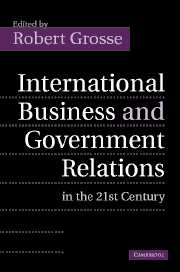Book contents
- Frontmatter
- Contents
- List of figures
- List of tables
- List of contributors
- Acknowledgments
- Introduction
- Part I History and theories of analysis of international business–government relations
- 1 Early US business-school literature (1960–1975) on international business–government relations: its twenty-first-century relevance
- 2 Institutional reform, foreign direct investment, and European transition economies
- 3 Corporate governance in the global economy: international convergence or continuing diversity?
- 4 Revisiting rival states: beyond the triangle?
- Part II The shifting international business–government partnership
- Part III Bargaining theory and the obsolescing bargain
- Part IV Host and home government views of international business
- Conclusions
- References
- Select bibliography of J. N. Behrman's works
- Index
3 - Corporate governance in the global economy: international convergence or continuing diversity?
Published online by Cambridge University Press: 22 September 2009
- Frontmatter
- Contents
- List of figures
- List of tables
- List of contributors
- Acknowledgments
- Introduction
- Part I History and theories of analysis of international business–government relations
- 1 Early US business-school literature (1960–1975) on international business–government relations: its twenty-first-century relevance
- 2 Institutional reform, foreign direct investment, and European transition economies
- 3 Corporate governance in the global economy: international convergence or continuing diversity?
- 4 Revisiting rival states: beyond the triangle?
- Part II The shifting international business–government partnership
- Part III Bargaining theory and the obsolescing bargain
- Part IV Host and home government views of international business
- Conclusions
- References
- Select bibliography of J. N. Behrman's works
- Index
Summary
Introduction
The corporation in all its forms is ultimately a creature of the state. Whatever its origins and purposes, the corporation is an artificial institution, granted certain status and privileges, and usually limited in its activities in various ways. This chapter focuses on the status and direction of business corporations within the political jurisdictions (“polities”) that constitute their host environments and that establish the bases and limits of their powers. The issues involved can be best understood as aspects of corporate governance, which includes both the pattern of enterprise ownership (including state ownership) and the ways in which ownership, regulation, and other bases of control are utilized to legitimate the corporation as an institution and direct/restrict its activities.
The question addressed here is this: “Are the systems of corporate governance prevailing in the diverse environments of the contemporary “global” economy becoming, or likely to become, more similar; or are national and regional differences in corporation–polity relationships being preserved, or even increased?
This question is of particular interest to managers of multinational corporations. If significant differences among countries continue to exist, they may be exploited for strategic purposes; on the other hand, increasing similarity among corporate governance systems may simplify government–business relationships and decrease reporting and regulatory costs.
- Type
- Chapter
- Information
- Publisher: Cambridge University PressPrint publication year: 2005



